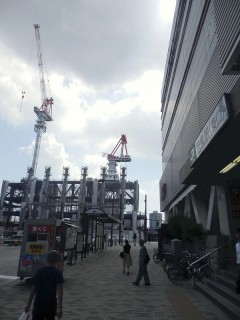Loading
Search
▼ Rich Buyers Stifle Tokyo Housing Sales
- Category:Other
Bloomberg
TOKYO (Bloomberg) — Rich buyers taking advantage of record low borrowing costs have pushed prices in Tokyo beyond the reach of many ordinary buyers, taking the wind out of property sales.
While the average sales price of an apartment in greater Tokyo rose 9.1 percent to a 24-year high of ¥55.2 million in 2015, offerings dropped by almost 10 percent, according to data by the Real Estate Economic Institute Co. Deals of properties with a price tag of ¥100 million or more climbed 86 percent, while those of cheaper homes under ¥50 million fell by 18 percent. The nation’s biggest banks including Mitsubishi UFJ Financial Group Inc. lowered variable mortgage interest rates to a record low of 0.625 percent this month.
The decline in borrowing costs and the wealth effect from rising Japanese share prices under Prime Minister Shinzo Abe have favored wealthier Japanese more than ordinary households, who are finding Tokyo apartment costs increasingly prohibitive. Cheap debt may not be enough to sustain price gains this year as a stock rout damps sentiment, creating headwinds for property developers and mortgage lenders, according to analysts.
“With the rise in new apartment prices, they are now beyond the reach of many regular buyers,” said Hidetaka Yoneyama, a senior research fellow at Fujitsu Research Institute. “It is getting more and more difficult to hike prices as those who purchased on the back of the positive asset effect are now declining too as share prices soften.”
The average price for apartments in Tokyo and commuter regions has climbed 22 percent during the past three years, according to the Real Estate Economic Institute. The increases are coming even as average Japanese base wages in November fell 1.4 percent from three years earlier to about ¥239,250, data from the Labor Ministry show.
With building costs and land prices rising, it has become increasingly difficult to pass on those charges in suburban developments, so large developers have been building more luxury apartments targeting the wealthy, according to a report last week by analysts Tomoyoshi Omuro and Junichi Sano at Morgan Stanley MUFG Securities Co.
The decline in new purchases in December to 65 percent of offered properties and higher inventories raise concerns that sales may peak out together with profit levels at large developers in the segment, according to the report.
A weakening yen during Abe’s first three years in power since the end of 2012 and the comparative cheapness of Tokyo homes against other major international cities have also attracted investments from overseas individual buyers and property investors such as Blackstone Group LP, pushing up prices.
“The ¥100 million to ¥200 million range seems to be turning commonplace, and debt is cheaper than it’s ever been,” said Christian Mancini, the chief executive officer of northeast Asia at Savills PLC, a property services company. “Anecdote suggests that the ¥500 million to ¥1 billion range is still very much the domain of the foreign cashed-up buyer.”
A pull-back of “Asian money” from Tokyo’s real estate market at a time when local income levels aren’t keeping up with apartment price gains is potentially bad news for the Bank of Japan’s rosy economic outlook, said Yasunari Ueno, chief market economist at Mizuho Securities Co. in Tokyo. A fall in the price of residential property values could also trigger losses at banks that lend against the homes as collateral, he said.
- January 27, 2016
- Comment (0)
- Trackback(0)


